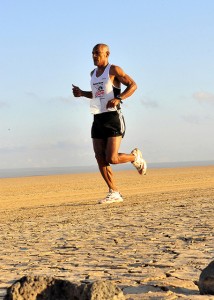This post is a part of the ongoing Patheos Book Club discussion on Mark Scandrette’s Free: Spending Your Time and Money on What Matters Most.
I like Mark Scandrette. Just his term “Jesus dojo” has animated my imagination for years and that’s not to speak of the practices and experiments in Christianity he brings to what can be a stayed and stale religion. Scandrette is always able to write books that offer a serious answer to Jesus’ calls and yet also show how live in the light and easy burden of that yoke. Scandrette wants us to have fun with the Christian life, to realize we live in a world of grace and care and that God is in charge. His new book Free: Spending Your Time and Money On What Matters Most is another book full of powerful personal stories from his own family and friends, and also imaginative practices for living into God’s kingdom.
Beyond being a book by Mark Scandrette, Free has a ready appeal to me. I’m kind of a time management junkie. I’ve read hosts of time management books and quite a few personal finance books as well. Not that I’m good at either. My reading habits reflect my needs in this case more than my competency. I’m constantly struggling to balance all the things I want to do, my obligations and the plain old stuff of everyday life. And until I met my wife who did more good to my personal budget than any book (and who also helps me marshal my time) I never really had good financial habits. Whether you are good or bad at spending your time and money Free is different from most books on the subject. It is not a book on how you can you can be like the “Millionaire Next Door” or how you can always be “Getting Things Done.” It is rather a book on how to be responsible with your time and money so that you can live most fully into the kingdom of God. This means focusing one’s financial life around frugality, simplicity, and generosity rather than how to get the big house in the gated community and the newest Lexus SUV. When it comes to time Scandrette is not interested in your ability to produce more and more in an ever more organized schedule. Scandrette helps us imagine how we can use our time to make it available to God and the people around us through whom we find God.
I’m in a season of life where both my time and money are stretched tighter than they have been in many years. I am coming off of a year in which I worked from home, set my own schedule and had a great deal of freedom with time. I worked a great deal, but it would be in bits and pieces with lunches at home and the ability to drop everything for a trip to the park if I had no pressing deadlines. We did not have a lot of money, but we didn’t feel squeezed in our budget. In our food choices, which are very important to us, we were able to buy what we pretty well pleased. Now I am a student again, just starting seminary, and much of my time is tied up in school work. I’m able to do a little for income here and there, but the vast majority of my time is now directed toward preparation for ministry. Many in our church and family have helped out with our expenses in this time of preparation and since we are now living very much from the help of others we are especially mindful of how we spend what little we have in a way that we didn’t when we had simply earned the money ourselves.
It was helpful then to read and put into practice Scandrette’s chapter on “Creating a Spending Plan.” In many ways the chapter was a confirmation of what my wife and I had already been doing. We have created a well categorized budget that covers both weekly and monthly expenses, but also the annual or occasional expenses such as car insurance and gifts (though most of those are going to be modest or homemade as Scandrette recommends). One thing that we had not thought through and was quite helpful was Scandrette’s suggestion of thinking in financial seasons.
Scandrette offers five financial seasons through which we might pass: discovery, recovery, preparation or transition, providing, and giving. Discovery is the season in which a person, typically a young person, is just discovering a new financial situation. Discovery could also come at the beginning of a marriage or after graduation from a graduate program. Recovery is coming out of some serious financial trouble–heavy debt, bankruptcy, etc. Preparation or transition is the stage in which a person is preparing or moving into something new. Providing is the season in which a person is financially established and providing for dependents. Giving is the season in which all dependents have left or a person is without dependents and financial resources are fairly free to be given more broadly (giving, suggests Scandrette, should be involved in all seasons to varying degrees).
My family is clearly in the preparation stage now. We are moving from a fairly stable providing stage and are now in a situation in which I am primarily a student and my wife Emily is balancing care for our daughter and beginning her own work in a new part of the country. In a few years we will return again to the providing stage, but for now we are preparing for what I hope to be service as a priest in the Episcopal Church.
Scandrette asks us to connect our “deeper life purpose and values with concrete financial goals.” This means that we must ask the question of what our real purpose in life is and then use that as a measurement for our finances. Scandrette then tells us to “think through specific goals for the next one to three years.” For us that is a perfect time because my seminary education will cover the next three years of our life.
After setting big goals Scandrette offers a checklist of potential goals for categories such as spending/giving, debt reduction, work and earning, saving, and investing. Since my wife and I are in the preparation stage saving and investing are not our highest priorities. Instead we are working to reduce our monthly expenses to a minimal level, finding ways for both of us to bring in income with the little extra time we have, and keeping debt free. Giving is going to be difficult for us because we are living from gifts (of course we always really are), but we are also seeking ways to honor the continuing economy of grace and gifts that we believe God calls us to whether we have much or little.
Mark Scandrette’s Free is a welcome book, one that would serve as an excellent starting point for Christians to gather around and ask the hard questions of where our treasures are. Where we spend our time and money says far more than any creeds we recite. Scandrette offers sound and practical, fun and experimental ways to align the minute details of our lives–our calendars and our bank accounts, our leisure time and our work with the grace filled world of God’s coming and eternal Kingdom.











